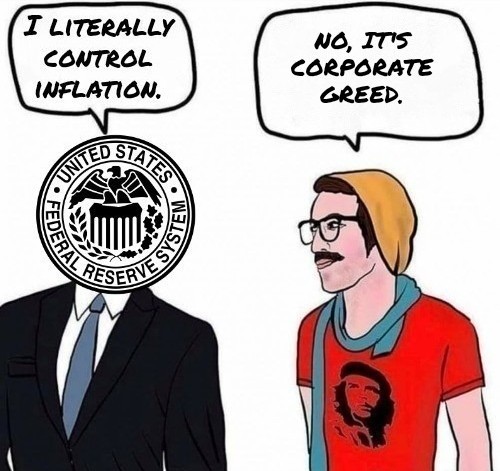I literally control inflation No it s corporate greed United States Federal Reserve System
This image depicts a comic-style conversation between two contrasting characters. On the left is a figure representing the United States Federal Reserve System, recognizable by the emblem of the eagle and the title on the seal. The figure has the body of a businessman, dressed in a suit and tie, which is typical attire for professionals within the financial and banking sectors. This character's head, however, is replaced by the seal of the Federal Reserve, suggesting that it personifies the institution itself.
The figure on the right is a young man with facial hair, glasses, and a casual, somewhat retro dress style, including a T-shirt featuring an image of Che Guevara. His appearance aligns with the stereotypical image of a socially conscious activist or someone who might hold anti-establishment views. The contrast between the conservative business attire of the Federal Reserve representative and the casual activist clothing creates a visual dichotomy representing differing social and economic philosophies.
In the speech bubble above the Federal Reserve character, the text reads, "I literally control inflation." This statement suggests that the personified Federal Reserve believes in its ability to manage the economy's inflation rates, a major part of the institution's actual responsibilities in real life. The word "literally" is used for emphasis, underlining the institution's perceived power and responsibility.
Conversely, the young man's reply in his speech bubble, "No, it's corporate greed," introduces an alternate explanation for inflation. His retort embodies a common criticism from certain parts of the public or political discourse that attributes economic issues like inflation to the greed of corporations rather than to macroeconomic policies or regulations.
The humor in the image arises from the interplay of these two perspectives. It caricatures a serious and complex economic debate by pitting the dry, authoritative voice of an economic institution against a simplified and colloquial dissent that rejects that authority. The clash of opinions is a common source of satire, as it exaggerates the certainty with which each side holds its views, despite the complexities of real-world economic issues.
Lastly, the humor also comes from the use of the word "literally" in the Federal Reserve's speech bubble. It suggests a level of confidence and direct influence that is comically absolute, playing into the stereotype that institutions or government bodies often portray themselves as all-powerful or infallibly effective. The mismatch between the serious tone of the claim and the colloquial doubt expressed by the young man encapsulates a tension frequently found in political cartoons, where one-dimensional statements are humorously challenged by everyday logic or skepticism. I literally control inflation No it s corporate greed United States Federal Reserve System
